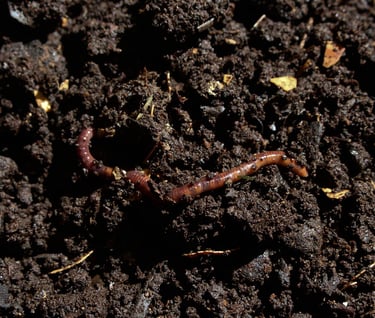The soil is our foundation
In this article, we unravel the complexity of healthy soil and its profound impact on our physical well-being, mental health, and spiritual connection.
Beneath our feet lies a realm of wondrous complexity that often goes unnoticed—the realm of fertile soil. It’s in this realm where we find a world teeming with diversity, invisible to the naked eye, but far from being insignificant. Bacteria, fungi, protozoa, and countless other creatures interact in delicate balance, each with a specific role in nutrient cycling and plant growth. The realm of soil forms a vibrant ecosystem, tirelessly breaking down organic matter, releasing vital components, and fostering the growth of vegetation.
Within this article, we shall unravel the complexity of soil life and its profound impact on our physical, mental, and spiritual well-being. Join us on this journey of discovery as we advocate for the protection and regeneration of soil, recognizing it as the probably most critical endeavor for our humankind.
Fertile soil: The foundation of our existence.
Once our soil thrives, so do our plants - this fact is anything but minor. We can live weeks without food, days without water, but only minutes without breathing. Through the process of photosynthesis, in which plants absorb carbon dioxide and release oxygen, we are ensured a constant supply of fresh, clean air for us to breathe. Without healthy soil, this just wouldn't be possible, displaying how crucial it is to our bare survival.
Also, plants emit phytoncides, natural airborne compounds that possess antimicrobial and immune-boosting properties. They help purify the air by neutralizing harmful bacteria, viruses, and allergens, and reduce the risk of respiratory illnesses. Plants further release volatile organic compounds (VOCs), such as terpenes, which have been found to possess therapeutic effects, promoting relaxation, reducing stress, and improving overall well-being.
The quality of our food is also inseparably linked to the health of the soil it is grown in. Fertile soil, rich in organic matter, minerals, and beneficial microorganisms, acts as a nurturing bed for crops. Favorable conditions result in nutrient-dense produce, offer plenty of vitamins, minerals, and antioxidants that support our physical health.
Conversely, soil degradation and contamination yield nutritionally depleted crops, affecting the well-being of both individuals and communities. Thus, safeguarding and regenerating soil health becomes paramount for the sustenance and vitality of future generations.
Our physical wellbeing is rooted in soil.


Nature’s harmony calming our minds.
Engaging with soil through gardening or simply immersing oneself in natural surroundings can evoke a sense of tranquility and grounding. Scientific research has shown that exposure to beneficial soil bacteria stimulates the production of serotonin, the neurotransmitter that promotes feelings of happiness and wellbeing. This harmonious connection with the earth can offer us comfort in an increasingly fast-paced and denatured world. It is within this union that we can reduce stress and rejuvenate our spirits, maintaining balance in the daily chaos of modern life.
Also, as we sensually witness the intricate web of life within soil, we are reminded of the eternal cycles of creation and regeneration, of birth, growth, decay, and rebirth. In nurturing soil, we literally connect with our roots, and acknowledge our dependence on the living ecosystem constantly nourishing us.
It is through the protection and regeneration of soil that we honor a sacred bond, nurturing not only our physical and mental selves, but also connect with "the greater whole" which is the source and essence of our being.
Our responsibility. Our duty.
The more we allow ourselves to face that fertile soil is a living organism, and that it is this organism on which we rely with our entire existence, the more we may understand the root cause for our physical, mental, and spiritual wellbeing... and suffering.
We may also find ourselves more drawn to our responsibility and duty to protect and regenerate our soils. Indeed, in the long run, this can turn to stand out as one of the most significant tasks ever bestowed upon us humans.
May we adopt agricultural practices that nourish our soils instead of depleting them, so that we can (re)create a symbiotic relationship that fills us with a sense of purpose. May we forge a path towards a future where fertile soil thrives, nourishing generations to come - in all aspects.


A complexity beyond words: The soil food web.
The soil food web is a fascinating and intricate network of interactions, crucial to healthy soil. Diverse organisms, including bacteria, fungi, protozoa, nematodes, earthworms, and insects, work harmoniously to decompose organic matter, recycle nutrients, and support plant growth. They co-create a dynamic system in which energy and nutrients flow efficiently, securing the health of all involved.
The whole process of decomposition is facilitated by a diverse array of microorganisms that break down organic matter. At the heart of this process are the decomposers, such as bacteria and fungi. When plants shed leaves, roots, and other organic materials, it's when they start getting to work. Thereby, bacteria are primarily responsible for breaking down the more labile compounds, such as sugars and proteins, while fungi excel at decomposing tougher substances like cellulose and lignin.
The decomposers play a vital role in recycling nutrients back into the soil. As they break down organic matter, they release essential elements like nitrogen, phosphorus, and potassium, which are essential for plant growth. These nutrients are made available to plants through a process called mineralization. The decomposers also produce organic matter-rich substances called humus, which improves soil structure, water-holding capacity, and nutrient-holding capacity.
The decomposers, in turn, serve as food sources for a range of soil-dwelling organisms. For example, nematodes are microscopic worms that feed on bacteria and fungi, regulating their populations and playing a crucial role in nutrient cycling. Protozoa, another group of microorganisms, consume bacteria and help maintain their numbers in balance.
Moving up the soil food web, larger organisms such as earthworms and insects play vital roles. Earthworms are ecosystem engineers, burrowing through the soil and mixing organic matter with mineral soil particles. Their burrows enhance soil aeration, water infiltration, and nutrient distribution, while their castings (excrement) are rich in nutrients and serve as a valuable source of organic matter. Earthworms also facilitate the activities of microorganisms by breaking down organic matter into smaller particles, making it more accessible for decomposition.
Insects, including beetles, ants, and termites, contribute to the soil food web through their feeding habits. Some insects feed on decaying plant material and contribute to decomposition, while others are predators that control the populations of smaller organisms. Additionally, certain insects, like bees, are important pollinators, facilitating plant reproduction and biodiversity.
The interactions within the soil food web are not limited to a single trophic level. The web is characterized by both direct and indirect interactions, forming a complex web of relationships. For example, mycorrhizal fungi establish symbiotic associations with plant roots. These fungi extend their hyphae into the soil, increasing the surface area available for nutrient absorption by plants. In return, the plants provide sugars and other organic compounds to the fungi, creating a mutualistic relationship that benefits both parties. For a more visual impression of how this works, you may check out this video from Dr. Elaine's Soil Food Web School:


As much as the soil food web is complex, as much it is fragile. Human activities can have a significant impact on the soil, its health, and its fertility. Practices such as excessive tillage, heavy pesticide use, and the application of synthetic fertilizers can disrupt the delicate balance of the soil ecosystem. These practices can harm beneficial soil organisms, reduce biodiversity, and degrade soil health over time. Conversely, adopting sustainable agricultural practices, such as cover cropping, crop rotation, and organic farming, can support the functioning of the soil food web and promote long-term soil fertility.
In conclusion, the soil food web is a complex and interconnected system that drives nutrient cycling, decomposition, and soil health. From decomposers like bacteria and fungi to larger organisms like earthworms and insects, each member of the soil food web plays a critical role in maintaining the balance and productivity of ecosystems. Recognizing and supporting the functioning of this intricate web of life is essential for sustainable land management and ensures the health of our soils for future generations.




"Living Soil" - A documentary by the Soil Health Institute

"A complete Guide to soil microbiology" by the Canadian Permaculture Legacy
This Guide is very practical - great for the geeks ;-)

"Bacteria, Fungi, and Soil Health" - by Nicole Masters
